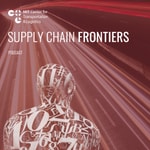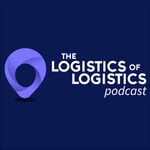MIT Supply Chain Frontiers – Détails, épisodes et analyse
Détails du podcast
Informations techniques et générales issues du flux RSS du podcast.

MIT Supply Chain Frontiers
mitsupplychainfrontiers
Fréquence : 1 épisode/58j. Total Éps: 34

Classements récents
Dernières positions dans les classements Apple Podcasts et Spotify.
Apple Podcasts
🇨🇦 Canada - management
04/08/2025#36🇬🇧 Grande Bretagne - management
04/08/2025#62🇫🇷 France - management
03/08/2025#87🇨🇦 Canada - management
02/08/2025#53🇫🇷 France - management
02/08/2025#77🇫🇷 France - management
01/08/2025#52🇫🇷 France - management
31/07/2025#35🇩🇪 Allemagne - management
28/07/2025#86🇩🇪 Allemagne - management
26/07/2025#98🇬🇧 Grande Bretagne - management
25/07/2025#95
Spotify
Aucun classement récent disponible
Liens partagés entre épisodes et podcasts
Liens présents dans les descriptions d'épisodes et autres podcasts les utilisant également.
See all- https://ctl.mit.edu/podcasts
8 partages
- https://freightlab.mit.edu/
5 partages
- https://sustainable.mit.edu/
4 partages
Qualité et score du flux RSS
Évaluation technique de la qualité et de la structure du flux RSS.
See allScore global : 52%
Historique des publications
Répartition mensuelle des publications d'épisodes au fil des années.
Vehicle Routing in the Age of AI
Épisode 30
mardi 16 juillet 2024 • Durée 47:35
Vehicle routing is one of the most well-understood, extensively studied problems in both history and academia—it's been studied by academics since the early 1800s. Yet 200 years later, optimal efficiency remains just out of reach. And given the enormous increase in pressure for consumer expectations in recent years, that remaining "last mile" of vehicle routing efficiency could, on a global scale, make a huge difference to a huge number of people.
In this episode, we're joined by Matthias Winkenbach, Director of Research at the MIT Center for Transportation & Logistics. Matthias is an expert in urban logistics, last-mile delivery, and vehicle routing, and he has just launched a new lab, the MIT Intelligent Logistics Systems Lab, that will use AI and machine-learning techniques to tackle today's vehicle routing challenges—and that could make a major impact on vehicle routing solutions where traditional methods and algorithms have come up just short.
Host & Executive Producer: Benjy Kantor Marketing Writer & Producer: Dan McCool Sound Editor: David Benjamin Sound Audio Engineer: Kurt Schneider
Empowering Micro Retailers in Emerging Markets
Épisode 29
mercredi 29 mai 2024 • Durée 43:03
In this episode, we sit down with members of the MIT Low Income Firms Transformation (LIFT) Lab: Director Josué Velázquez Martínez, Postdoctoral Researcher Sreedevi Rajagopalan, and Doctoral Student Fabio Castro.
We discuss the LIFT Lab's work empowering micro-retailers and nanostores in emerging markets to lift themselves out of poverty. These retailers, while making up an overwhelming majority of retail business in their regions, are at a significant disadvantage when dealing with large suppliers and competing with large retailers—some 30% of these firms fail within 5 years of opening.
Using generative AI, the LIFT Lab is helping these retailers enhance their business decision-making and supply chain capabilities to help them survive and thrive.
Host & Executive Producer: Benjy Kantor Marketing Writer & Producer: Dan McCool Sound Editor: David Benjamin Sound Audio Engineer: Kurt Schneider
Empathetic Leadership in the Field–More Insights with the MIT CTL Military Fellows
Épisode 20
jeudi 11 août 2022 • Durée 53:30
This episode marks the second installment of research scientist David Correll speaking with the 2021–22 MIT CTL military fellows: US Army Col. Joe Parker, Lt. Col. Brian Young, and Louisiana National Guard Lt. Col. Stephen J. Luebbert.
Today’s conversation is all about empathetic leadership. Parker, Young, and Luebbert discuss how leading teams in high-stress environments like military combat requires empathy and humility. They revisit continual process improvement, applying the "red cell" strategy, and the after-action review process. Sharing their personal stories, they portray how effective leaders listen to those around them and enthusiastically welcome positive and negative feedback to make sound decisions, foster team cohesion, and achieve peak performance.
Since 2007, MIT CTL has hosted three US military officers each year for a course of academic study that parallels the MIT ten-month Supply Chain Management master’s program. Sponsored by the United States Army War College’s Senior Service College Fellows (SSCF) program, top officers are selected to attend.
CTL Military Fellows accompany the more than 80 other global business professionals in the program’s curriculum and develop strong analytical, change management, and leadership skills. Their work includes an in-depth research project.
Supply Chains across Sectors - A Conversation with the MIT CTL Military Fellows
Épisode 19
mardi 26 avril 2022 • Durée 31:22
In today’s episode, research scientist David Correll speaks with the 2021–22 MIT CTL military fellows: US Army Col. Joe Parker, Lt. Col. Brian Young, and Louisiana National Guard Lt. Col. Stephen J. Luebbert. The fellows discussed their experiences in the military and the MIT SCM program.
For written and downloadable transcripts visit ctl.mit.edu
Their conversation explores the differences and similarities between private-sector and military supply chains in strategy, leadership, and on-the-ground implementation. We learn how in the private sector, cost and efficiency drive supply chain decision making, whereas in the military portability, safety, and redundancy may be seen as primary drivers. The episode ends with some ideas about how the government and private sector could collaborate more.
Since 2007, MIT has hosted three US military officers each year for a course of academic study that parallels the MIT ten-month Supply Chain Management master's program. Sponsored by the United States Army War College’s Senior Service College Fellows (SSCF) program, top officers are selected to attend.
CTL Military Fellows accompany the more than 80 other global business professionals in the program’s curriculum and develop strong analytical, change management, and leadership skills. Their work includes an in-depth research project.
Moderna’s Road to the Vaccine and Beyond
Épisode 18
vendredi 11 février 2022 • Durée 29:31
Join MIT Global SCALE Connect for an in-depth conversation with Paul Granadillo, SVP Global Supply Chain at Moderna. MIT Professor Yossi Sheffi speaks with Paul about how the pandemic vaccine response reshaped manufacturing, business, and supply chains at Moderna.
Mr. Granadillo shares his professional experiences learned from joining the company during a time of growth. He describes some of the methods Moderna uses to meet its logistics and production requirements during the ramp-up to a global Covid-19 vaccine rollout.
Recorded at MIT SCALE Connect, the winter education convening of the MIT Global SCALE Network.
Bottleneck Analysis to Understand Systems in Disruption
Épisode 17
mercredi 8 décembre 2021 • Durée 29:52
Bottleneck analysis aiming to increase asset productivity has commonly been applied inside the four walls of production and distribution facilities. The pandemic disrupted global supply chains with dramatic shifts in demand and constraints in supply with cascading effects. Shippers then dynamically shifted traditional origin-destination patterns causing stress on the networks of logistics service providers.
As a result, bottlenecks in the global movement of goods continue to emerge in new locations and for longer durations. Today we speak with Jarrod Goentzel, director of The Humanitarian Supply Chain Lab about how they study dramatic disruption of supply and demand during disasters and has created tools to rapidly identify bottlenecks and dynamically determine interventions to increase flow.
We discuss their conceptual approach and simulation models using the fuel supply chain in the U.S. with use cases around recent disruptions such as the Colonial Pipeline cyberattack and Hurricane Ida. For more information on the approaches visit: https://humanitarian.mit.edu/research/ and to learn more about joining the MIT CTL Supply Chain Exchange visit: https://ctl.mit.edu/outreach
Voices from Beyond the Open Road - Utilization, Shippers, and Driver Quality of Life pt. 2
Épisode 16
mercredi 29 septembre 2021 • Durée 38:41
Earlier this year, MIT CTL's David Correll spoke with over-the-road truckers about their experiences in order to shed light on why it is that U.S. truckers appear to be both scarce and underutilized at the same time.
During the year, Dr. Correll oversaw three MIT SCM master's capstones that addressed truck driver utilization and retention in contrast to shipper and receiver policies and practices. These were completed as part of the MIT FreightLab's Driver Initiative.
In today's episode, we hear how a variety of factors influence driver utilization, and how they may impact the widespread driver shortage currently experienced in the U.S. David's guests offer solutions that shippers, warehouse managers, dispatchers, and their companies can implement to improve.
Download a transcript of this episode.
Read the capstones covered in this episode.
Diving Deep into the Determinants of Driver Dwell Authored by: Michelle Catherine Roy, Leora Reyhan Sauter
Goldilocks and the Three Dispatchers: Quantifying the Impact of Dispatcher Management on Truck Driver Performance Authored by: Danielle Procter, Paulo Sousa Jr.
Automation of Warehouse Decision Making Authored by: Roogers Marino, Zeyu Wu
Amazon Last-Mile Routing Research Challenge Uncovers New Research Methods on a Global Scale
Épisode 15
mercredi 11 août 2021 • Durée 23:39
The MIT Center for Transportation & Logistics (MIT CTL) and Amazon engaged with a global community of researchers across a range of disciplines, from computer science to business operations, to supply chain management, challenging them to build data-driven route optimization models leveraging massive historical route execution data and machine learning models.
While we congratulated the winning teams and all participants in the news, Dr. Matthias Winkenbach joins today's Frontiers to share some insights and outcomes that the production of a research challenge brought about.
He speaks about how convening researchers from across all levels of academia and supplying rich data and a compelling problem, may drive more new research in areas of inquiry that are sparsely published on.
Learn more about the Challenge: https://routingchallenge.mit.edu/
Learn more about the Megacity Logistics Lab: https://megacitylab.mit.edu/
Key Performance and Key Learning Indicators in Digital Transformation
Épisode 14
mardi 15 juin 2021 • Durée 20:21
Today, on MIT Supply Chain Frontiers, editorial director, Ken Cottrill speaks with Maria Jesus Sáenz, director of MIT Digital Supply Chain Transformation Lab, about how companies use artificial intelligence and machine learning to identify key performance and key learning indicators during digital transformations.
Sáenz shares examples of how companies may use AI and ML to collaborate on data models and leverage publicly available data to craft more accurate forecasts or discover hidden efficiencies. Learn more about how AI and machine learning are used in digital transformations at digitlsc.mit.edu
View and download full transcript: https://ctl.mit.edu/podcasts/key-performance-and-key-learning-indicators-digital-transformation
Global Supply Chain Risk and Innovation with Mark Bakker
Épisode 13
jeudi 13 mai 2021 • Durée 38:13
In today’s episode, Research Scientists Alexis Bateman and Inma Borrella speak with Mark Bakker, Senior Vice President and General Manager of Global Operations at Hewlett Packard Enterprise about the tools and skills needed for sustained global supply chain management when facing disruptions.
Mark shares his insights about how HP Enterprise balanced demand and supply during uncertain conditions brought about by various disruptions. He shares tips about the skills and attitudes needed to succeed in today's business environments.


